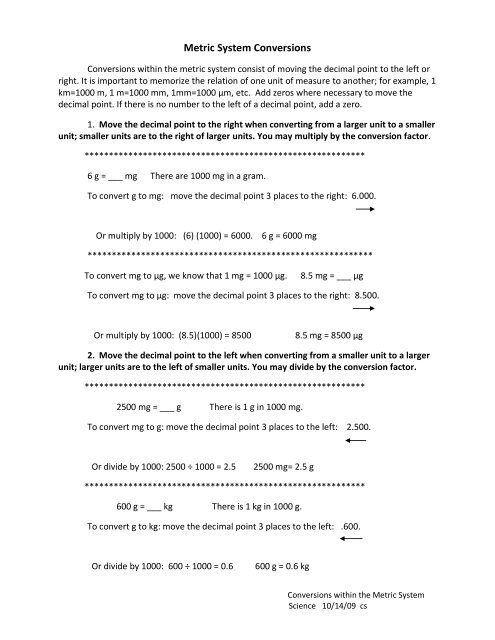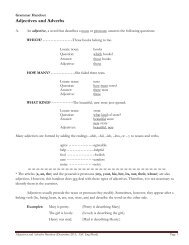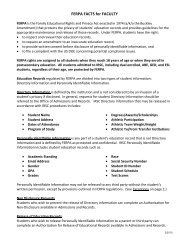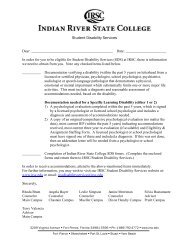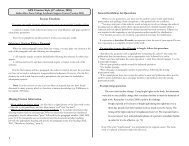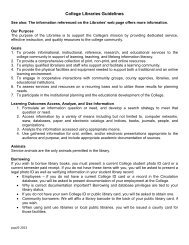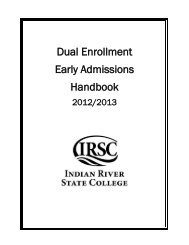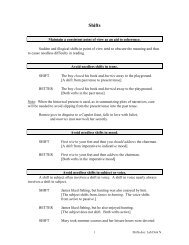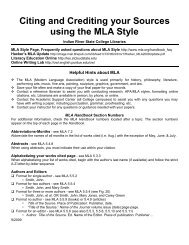Metric System Conversions
Metric System Conversions
Metric System Conversions
You also want an ePaper? Increase the reach of your titles
YUMPU automatically turns print PDFs into web optimized ePapers that Google loves.
<strong>Metric</strong> <strong>System</strong> <strong>Conversions</strong><br />
<strong>Conversions</strong> within the metric system consist of moving the decimal point to the left or<br />
right. It is important to memorize the relation of one unit of measure to another; for example, 1<br />
km=1000 m, 1 m=1000 mm, 1mm=1000 µm, etc. Add zeros where necessary to move the<br />
decimal point. If there is no number to the left of a decimal point, add a zero.<br />
1. Move the decimal point to the right when converting from a larger unit to a smaller<br />
unit; smaller units are to the right of larger units. You may multiply by the conversion factor.<br />
**********************************************************<br />
6 g = ___ mg There are 1000 mg in a gram.<br />
To convert g to mg: move the decimal point 3 places to the right: 6.000.<br />
Or multiply by 1000: (6) (1000) = 6000. 6 g = 6000 mg<br />
***********************************************************<br />
To convert mg to µg, we know that 1 mg = 1000 µg. 8.5 mg = ___ µg<br />
To convert mg to µg: move the decimal point 3 places to the right: 8.500.<br />
Or multiply by 1000: (8.5)(1000) = 8500 8.5 mg = 8500 µg<br />
2. Move the decimal point to the left when converting from a smaller unit to a larger<br />
unit; larger units are to the left of smaller units. You may divide by the conversion factor.<br />
**********************************************************<br />
2500 mg = ___ g There is 1 g in 1000 mg.<br />
To convert mg to g: move the decimal point 3 places to the left: 2.500.<br />
Or divide by 1000: 2500 ÷ 1000 = 2.5<br />
2500 mg= 2.5 g<br />
**********************************************************<br />
600 g = ___ kg There is 1 kg in 1000 g.<br />
To convert g to kg: move the decimal point 3 places to the left: .600.<br />
Or divide by 1000: 600 ÷ 1000 = 0.6<br />
600 g = 0.6 kg<br />
<strong>Conversions</strong> within the <strong>Metric</strong> <strong>System</strong><br />
Science 10/14/09 cs
3. A third method of converting is to use ratio-proportion. Set up the conversion,<br />
stating the known equivalent first, then the unknown, keeping the relationship of the units<br />
the same, e.g., mg:kg or mL:L.<br />
**********************************************************<br />
500 mL = ___ L There are 1000 mL in a L (liter)<br />
1000 mL = 500 mL 1000x = 500 x = 0.5 L<br />
1 L x L<br />
**********************************************************<br />
3.7 g = ___ mg There are 1000 mg in 1 g<br />
1000 mg = x mg 1 x = 3700 x=3700 mg<br />
1 g 3.7 g<br />
4. One of the exceptions to using the metric system today is in calculating fluid<br />
volumes. Fluids are often measured in ounces, a household measure. Remember, one fluid<br />
ounce = 30 mL.<br />
8 ounce carton of milk = ___ mL 8 x 30 = 240 mL<br />
5. Another exception is weight. Scales may only give weight in pounds. One kilogram =<br />
2.2 pounds. Using ratio-proportion, convert these weights:<br />
135 pounds = ____ kg 1 kg = x kg 2.2x = 135 x = 61.4 kg<br />
2.2 pounds 135 pounds<br />
**********************************************************<br />
75 kg = ___ pounds 1 kg = 75 kg x = 165 pounds<br />
2.2 pounds x pounds<br />
<strong>Conversions</strong> within the <strong>Metric</strong> <strong>System</strong><br />
Science 10/14/09 cs
Conversion Practice problems<br />
1. 4 g = _____ mg 17. 3500 µg = _____ g<br />
2. 400 mg = _____ g 18. 1400 mL = _____ L<br />
3. 300 g = _____ kg 19. 320 mg = _____ g<br />
4. 700 mL = _____ L 20. 210 mg = _____ µg<br />
5. 218 pounds = _____ kg 21. 82 kg = _____ pounds<br />
6. 2.3 mg = _____ µg 22. 0.23 g = _____ mg<br />
7. 0.5 L = _____ mL 23. 150 µg = _____ mg<br />
8. 3.5 gm = _____ mg 24. 16 fluid ounces = _____ mL<br />
9. 1.5 L = _____ mL 25. 250 mL = ____ L<br />
10. 850 mL = _____ L 26. 625 mg = ____ g<br />
11. 120 µg = _____ mg 27. 17 mg = _____µg<br />
12. 10 mg = _____ g 28. 100 µg = _____g<br />
13. 0.004 g = _____ mg 29. 1.85 L = _____ mL<br />
14. 6.5 fluid ounces = _____ mL 30. 750 mg = _____ g<br />
15. 100 cm = _____ m 31. 750 mm = _____ m<br />
16. 50 m = _____ km 32. 14 mm = _____ cm<br />
<strong>Conversions</strong> within the <strong>Metric</strong> <strong>System</strong><br />
Science 10/14/09 cs
Answers for <strong>Metric</strong> Conversion Problems<br />
1. 4000 mg 17. 0.0035 g<br />
2. 0.4 g 18. 1.4 L<br />
3. 0.3 kg 19. 0.32 g<br />
4. 0.7 L 20. 210000 µg<br />
5. 99.1 kg 21. 180.4 pounds<br />
6. 2300 µg 22. 230 mg<br />
7. 500 mL 23. 0.15 mg<br />
8. 3500 mg 24. 480 mL<br />
9. 1500 mL 25. 0.25 L<br />
10. 0.85 L 26. 0.625 g<br />
11. 0.12 mg 27. 17000 µg<br />
12. 0.01 g 28. 0.0001 g<br />
13. 4 mg 29. 1850 mL<br />
14. 195 mL 30. 0.75 g<br />
15. 1 m 31. 0.75 m<br />
16. 0.05 km 32. 1.4 cm<br />
<strong>Conversions</strong> within the <strong>Metric</strong> <strong>System</strong><br />
Science 10/14/09 cs


